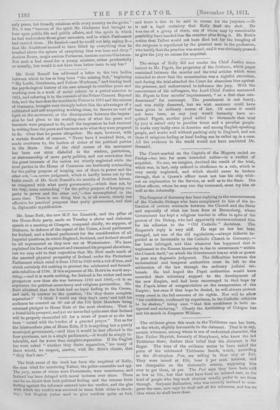Mr. Isaac Butt, the new M.P. for Limerick, and the
pillar of the Home-Rule party, made on Tuesday a clever and elaborate speech at a meeting at Glasgow, composed chiefly, we suppose, of Irishmen, in defence of the repeal of the Union, a local parliament for Ireland, and a federal parliament for the consideration of all Imperial questionssia which England, Scotland, and Ireland should be all represented as they now are at Westminster. We have explained his line of argument and examined his proposal elsewhere, but we may add to that exposition that Mr. Butt made much of the assorted physical prosperity of Ireland under the Protestant Parliament which ruled it from 1782 to 1800 with a rod of iron, and which certainly did nothing to prevent the celebrated and formid- able rebellion of 1798. If this argument of Mr. Butt's be worth any- thing,—and it is worth nothing, for Ireland is far richer and more prosperous now than she was between 1782 and 1800,—it is an argument for political ascendancy and religious persecution. Mr. Butt admitted that the Irish had no loyal feeling to the Crown, and said, in answer to the question, they desire complete separation ?' I think I could say they don't care,' and told his audience he counted on 80 out of the 103 Irish Members being returned pledged to Home Rule at the next elections. That is a formidable prospect, and yet we never feel quite sure that Ireland will be properly reconciled till for a score of years or so she hae been "cursed with the burden of a granted prayer." But as for the intermediate plan of Home Rule, if it is anything but a purely municipal government,—and then it would be best effected in the four, provinces, not in a single parliament,--it would be simply in- tolerable, and far worse than complete separation. If the English too were asked " whether they desire separation," too many of them would, we suspect, answer, with Mr. Butt's clients, that "they don't care."


































 Previous page
Previous page